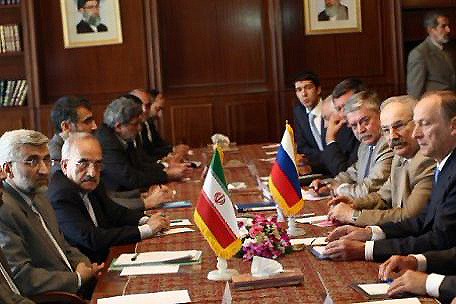Iran Cannot Rely on Russia

IRD: it seems that Iran’s nuclear program enters a new phase every day, inciting the country’s friends and foes to restate their positions. Following the Fordo nuclear enrichment hype, once again each involved country has announced its response. As expected the West condemned and criticized Iran’s nuclear efforts. Furthermore, despite the IAEA’s monitoring of Iran’s nuclear activities in Fordo, allies like Russia have also expressed concerns.
In a dialogue with IRD, Bahram Amir-Ahmadian discusses this issue:
IRD: How do you evaluate Russia’s statement in regards to the Fordo enrichment issue?
BA: Through its policies and practices, Russia has declared that it will not tolerate a nuclear-powered Iran south of it borders. Iran’s use of nuclear technology for standard energy purposes, however, is not what Russia is concerned about. Russia has voted positively in four Security Council resolutions that require Iran to minimize its uranium enrichment program.
After delivering the Bushehr nuclear plant’s fuel, Russia expressed that it wishes to see Iran stop its enrichment efforts. In it’s ‘step-by-step’ plan, Russia has promised that once Iran has suspended enrichment the international community will relax sanctions on Iran. Therefore, despite popular belief, Russia’s position on Iran is not purely progressive.
Russia may delay UN Security Council actions against Iran; however, Iran cannot fully count on Russia’s help (despite Russia’s recent statement that announced the country’s desire to extend negotiation efforts with Iran regarding its nuclear issue). Similarly, Iran is interested in resolving these issues through negotiation. Along with the Security Council, the P5+1 agrees that Iran must halt its enrichment whereas Iran is insisting its enrichment program is for peaceful purposes. As a member of the P5+1, Russia has the power to veto any Security Council resolutions against Iran; however, it is requiring Iran to keep negotiations going. Even so, Russia is in agreement with the West on suspension of Iran’s continued uranium enrichment.
IRD: Last week Turkish foreign minister Davotuglu visited Tehran. Upon his return to Turkey he announced that Iran and the P5+1 are ready to restart negotiations. Is Turkey in agreement with Russia over Iran?
BA: Turkey has repeatedly stated that as Iran’s neighbor, any problems with Iran will have an effect on it. Therefore, Turkey is keen to join in the negotiations but experience has shown that nothing will go forward without P5+1’s agreement. Hence Brazil or Turkey will not be able to effectively change the course of current events. Additionally, Russia’s position on Iran is no different from the other members of the P5+1. Following the announcement of Russia’s ‘step-by-step’ plan, the Iranian media were expecting to see widespread agreements over this plan, yet this did not happen.
Turkey expressing readiness to engage in negotiations could bring some positivity, yet on its own will not be very effective. In order to raise its status in the international community, Russia will closely follow Iran’s nuclear developments, and so will Turkey.
IRD: How helpful can Russia be for Iran?
BA: Iran cannot count on Russia. The ‘step-by-step’ plan has already been proposed by Russia but it did not gain traction. Russia has announced its support in four Security Council resolutions against Iran’s enrichment program. In its ‘step-by-step’ plan Russia promised that once Iran stops its uranium enrichment, international sanctions would be reduced; therefore, it seems that Russia will not be a reliable partner for Iran.

